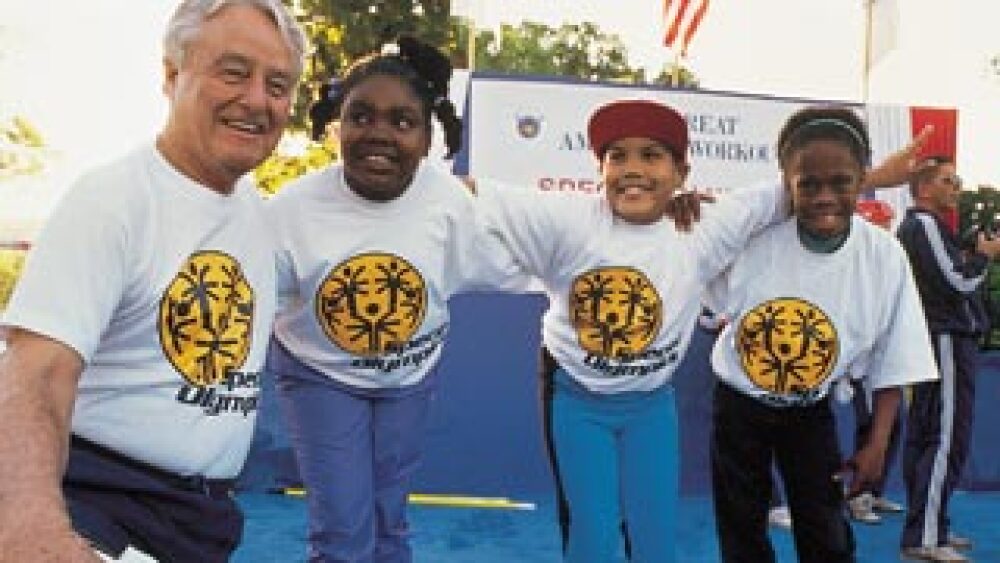Special Olympics
While Eunice Kennedy Shriver is the founder of Special Olympics, her husband, Sargent Shriver, was deeply involved, as well. Sarge lent his talent, skill, enthusiasm, deftness, and charisma to the cause, drawing on his previous work as an ambassador, Peace Corps director, international attorney, and politician to open doors around the world for Special Olympics programs.
Sarge’s had a significant impact on Special Olympics. His official involvement in the organization began in 1984 when he became its President. In 1990, he was elected Chair of the Board, ending his tenure in 2003. Using his skills as a politician, diplomat, peacemaker and person of faith, he opened doors in the former Soviet Union, China, Tunisia, New Zealand, South Korea, all throughout Eastern Europe and many other countries, helping Special Olympics grow from a U.S.-based mission to the global organization it is today.
But Special Olympics wasn’t just about growth to Sarge - it was about making change. He saw how Special Olympics could be used for peacebuilding between nations with political discord or unrest. He believed in the unifying effect of a simple sporting event - and used sports as a doorway to dialogue about the human rights issues surrounding people with intellectual disabilities.
Jamie Kirkpatrick, the Director of International Programs during Sarge’s tenure, stated:
“He was a tireless ambassador for change: passionate, optimistic, energetic, vigorous, and always joyful. On long international flights, he would spend the hours reading his missal or reflecting on what needed to be done to advance the cause of people with intellectual disabilities in some new corner of the globe. In many countries, he literally opened the door for athletes, families, and volunteers, breaking down barriers of language and cultures while offering a new vision of achievement, inclusion, and love. These travels always seemed to renew Sarge; the world was his stage and he loved making it a better place for all of us.”
Today, Special Olympics is active in 172 countries with more than two-thirds of the athletes coming from outside the United States -- and China boasts the largest program in the world.
National leaders have taken Sargent Shriver’s message that Special Olympics can accomplish great things quite seriously. At a press conference in Washington DC in 1990, Alexander Potemkin - the Minister-Counselor of the then Soviet Embassy - said: “Special Olympics will assist us all - East and West - to synchronize our moral compasses.” Internationally, Sargent Shriver impressed thousands of government officials and diplomats with his commitment to people with intellectual disabilities, inspiring them to make their own commitment.
In an excerpt from Scott Stossel’s biography on Shriver, Yan Ming Fu, the former deputy minister of China, is quoted as saying, after he sees Sarge (who was then 85 years old) get off a plane from an international flight: “He doesn’t have to be here. But he keeps doing this because working for retarded children is important. If we Chinese people have any pride in ourselves, we ought to match this kind of commitment to humanity ... we ought to treat these children with more respect.”
Sarge and Eunice’s son Timothy has continued the expansion of the organization in his capacity as Chair of the Board of the organization. He has solidified Special Olympics’ place in the international community. Today, Special Olympics reaches 4.5 million athletes through 228 programs in 172 countries. Under Timothy, the organization has also expanded into public education through the Unified Champion Schools® program, which engages schools in building dynamic, inclusive environments that allow all members of a school community, regardless of their abilities, to thrive and participate in the life and activities of the school.
To learn more about Special Olympics, visit www.specialolympics.org.


